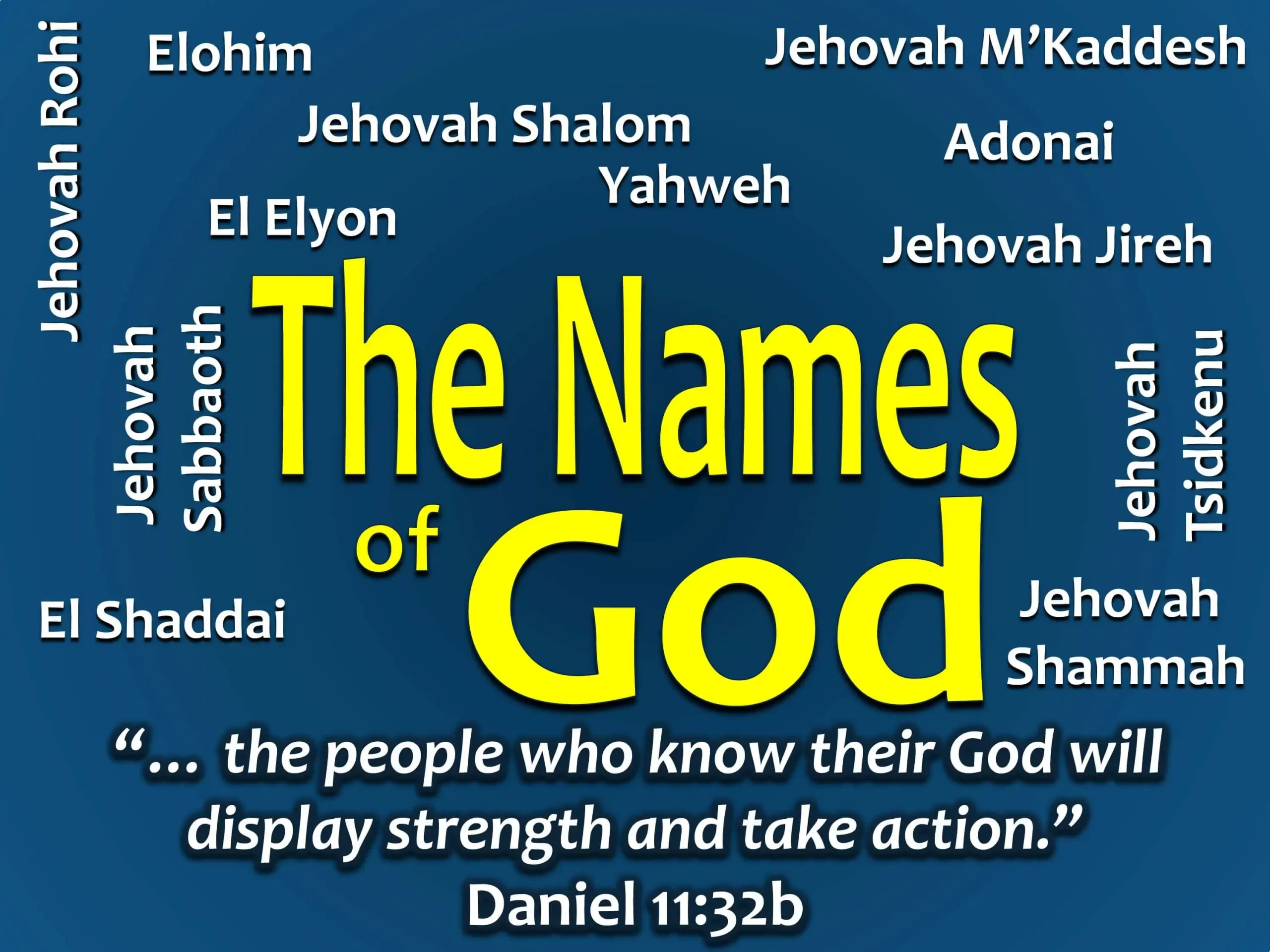How Many Names of God Exist?
The names of God reflect His very nature and character. God is eternal. He has existed before time itself.
The Psalmist David sings:
“Before the mountains were born or you brought forth the whole world, from everlasting to everlasting you are God.”
Psalm 90:2
God has no beginning or end; He is eternal and endless. Some Bible Scholar has estimated that God has about 955 names.
Each name of God has a significant meaning and is revealed to us through different circumstances. Let us look at the different names of God along with their meaning below.
What Are The Names of God Found In The Bible?

Here Are 39 Different Names of God That The Bible Mentions:
- Yahweh (YHWH) (Exodus 6:2-3)
- Elohim (Genesis 1:26)
- Adonai (Judges 6:15)
- Jehovah-Jireh (Genesis 22:14)
- Jehovah-Rapha (Exodus 15:26)
- Jehovah-Nissi (Exodus 17:13-16)
- Jehovah-Shalom (Judges 6:24)
- Jehovah-Rohi (Psalm 23)
- El Shaddai (Genesis 17:1)
- Abba (Galatians 4:6)
- Alpha and Omega (Revelation 22:13)
- Immanuel (Isaiah 7:14)
- Logos (John 1:1)
- Savior (Isaiah 19:20)
- Holy One (Mark 1:24)
- Ancient of Days (Isaiah 43:13)
- Rock (Psalm 71:3)
- Redeemer (Isaiah 48:17)
- King of Kings (Revelation 17:14)
- Lord of Lords (Deuteronomy 10:17)
- The Most High (Psalm 97)
- The Great I AM (Matthew 11:28)
- The Beginning and the End (Isaiah 46:10)
- The First and the Last (Revelation 22:13)
- The Bright Morning Star (Revelation 22:16)
- The Everlasting Father (Isaiah 9:6)
- The Prince of Peace (Isaiah 9:6)
- The Bread of Life (John 8:35)
- The Living Water (John 6:35)
- The Good Shepherd (John 10:11)
- The Way, the Truth, and the Life (John 14:6)
- The Resurrection and the Life (John 11:25)
- The Lamb of God (John 1:29)
- The Light of the World (John 8:12)
- The Vine (John 15)
- The Cornerstone (Isaiah 28:16)
- The Lion of Judah (Revelation 5:5)
- The Great High Priest (Hebrews 4:14-16)
- The Almighty (Revelation 1:8)
What Are The Unique Names of God?
His Unique Names!
Here are a few unique but common names of God:
- Alpha and Omega: This title is used in the book of Revelation, explaining God’s eternal nature and His presence from the beginning to the end. (Revelation 1:8)
- Immanuel: This name means ‘God with us’ and is prophesied in the Old Testament and associated with Jesus in the New Testament. It shows God’s desire to dwell among His people. (Isaiah 7:14, Matthew 1:23)
- Logos: In the Gospel of John, Jesus is referred to as the ‘Word’ or ‘Logos’ in Greek, focusing on His divine nature and His role in creation and revelation. (John 1:1-14)
- Savior: This title emphasizes God’s role as the deliverer and redeemer of humanity, especially in His love for us through salvation and forgiveness of sins. Jesus is the Savior of us all. (Luke 2:11, Acts 4:12).
- Holy One: This name highlights God’s absolute purity, righteousness, and separation from sin. It is used to show His holiness and uniqueness. (Psalm 71:22, Isaiah 40:25)
- Ancient of Days: This name is used in the book of Daniel to describe God as the eternal and ageless One who holds authority and judgment. (Daniel 7:9). He holds it all together, and nothing ever slips His eye.
- Rock: God is often referred to as a ‘Rock,’ symbolizing His faithfulness, strength, and refuge. It represents His unchanging nature and dependability. (Deuteronomy 32:4, Psalm 18:2). Men may let us down, but the Lord will always keep His promise.
What Are Some Names of God And Their Meanings?
Here are the most common names of God with their meanings:
1. Yahweh (YHWH):-
This is the name of God revealed to Moses in Exodus 3:14, “God said to Moses, “I am who I am. This is what you are to say to the Israelites: ‘I am has sent me to you.’”
It signifies God’s self-existence, eternal nature, and faithfulness to His covenant with His people.
2. Elohim pronounces [el-oh-heem]:-
This is the name of God and is often translated as ‘God’ in English. It symbolizes God’s power, authority, and might as the Creator of the universe.
Genesis 1:1 says, “In the beginning, God (Elohim) created the heavens and the earth.” God is the supreme Creator who brought forth the entire universe into existence.
3. Adonai pronounces []
This term is translated as ‘Lord’ and symbolizes God’s authority, sovereignty, and ownership. The Lord says in Psalm 50:10,
“For every animal of the forest is mine, and the cattle on a thousand hills.” His ownership is clear here.
4. El Shaddai – pronounces []
This name is often translated as ‘God Almighty.’ It highlights God’s power, strength, and sufficiency. Genesis 17:1 says,
“When Abram was ninety-nine years old, the Lord (Yahweh) appeared to him and said, ‘I am God Almighty (El Shaddai); walk before me faithfully and be blameless.’”
Here, God reaffirms His covenant with Abram and instructs him to walk faithfully before Him. The name ‘El Shaddai’ emphasizes God’s ability to fulfill His promises and underscores His sovereignty and provision.
5. Jehovah-Jireh – pronounces []
This name means ‘The Lord Will Provide.’ It points to God as the One who supplies our needs and provides for us.
Genesis 22:14 speaks of Abraham’s story of providence,
“So Abraham called that place The Lord Will Provide (Jehovah Jireh). And to this day it is said, ‘On the mountain of the Lord it will be provided.’”
This verse illustrates Abraham’s willingness to sacrifice his son Isaac as a test of faith. Just as Abraham was about to offer Isaac as a burnt offering, God intervened and provided a ram caught in the thicket as a substitute.
In response to this provision, Abraham named the place ‘The Lord Will Provide’ or ‘Jehovah Jireh.’ This name signifies God’s ability and faithfulness to provide for the needs of His people.
6. Jehovah-Rapha – pronounces []
This name means ‘The Lord Who Heals.’ It signifies God as the healer of physical, emotional, and spiritual ailments.
Moses explains in Exodus 15:26. He talks about God being Jehovah Rapha.
“He said, ‘If you listen carefully to the Lord your God and do what is right in his eyes, if you pay attention to his commands and keep all his decrees, I will not bring on you any of the diseases I brought on the Egyptians, for I am the Lord, who heals you (Jehovah Rapha).’”
In this verse, God speaks to the Israelites after their deliverance from Egypt and promises to be their healer.
God assures the Israelites that if they obey His commands and follow His ways, He will protect them from diseases and be their healer.
7. Jehovah-Nissi:
This name means ‘The Lord Is My Banner.’ It represents God as the One who gives victory and protection. Exodus 17:15 illustrates this, “Moses built an altar and called it The Lord Is My Banner (Jehovah Nissi).”
This verse comes from the account of the battle between the Israelites and the Amalekites. As long as Moses held up his hands, Israel prevailed in battle, but when his hands grew weary, the Amalekites gained the upper hand.
Aaron and Hur supported Moses’ hands, and ultimately, the Israelites emerged victorious. In response to this victory, Moses built an altar and named it “The Lord Is My Banner” or “Jehovah Nissi.”
8. Jehovah-Shalom
This name means ‘The Lord Is Peace.’ It emphasizes God as the source of true peace and harmony. Judges 6:24 says, “So Gideon built an altar to the Lord there and called it The Lord Is Peace (Jehovah Shalom). To this day it stands in Ophrah of the Abiezrites.” This verse comes from the story of Gideon, who was called by God to deliver the Israelites from the oppression of the Midianites. After receiving confirmation from God through miraculous signs, Gideon built an altar and named it “The Lord Is Peace” or “Jehovah Shalom.” This name shows God as the source of true peace and harmony.
9. Jehovah-Rohi
This name means ‘The Lord Is My Shepherd.’ It portrays God as the caring and guiding Shepherd who leads and provides for His people. Psalm 23:1 talks about the Lord being our Jehovah Rohi, “The Lord is my shepherd; I shall not want.” In this well-known Psalm, David proclaims that the Lord is his shepherd. The imagery of a shepherd and sheep highlights God’s role as a caring and guiding shepherd, leading and providing for His people.
10. Jehovah-Tsidkenu
This name means ‘The Lord Our Righteousness.’ It highlights God’s righteousness and His role in providing righteousness to His people. The prophet Jeremiah says in Jeremiah 23:6, “In his days Judah will be saved, and Israel will dwell securely. And this is the name by which he will be called: ‘The Lord is our righteousness (Jehovah Tsidkenu).’” In this verse, the prophet Jeremiah speaks of a future righteous ruler who will bring salvation and security to Judah and Israel. The name by which this ruler will be called is ‘Jehovah Tsidkenu,’ saying that God Himself is their righteousness.
11. Jehovah-Sabaoth
This name means ‘The Lord of Hosts’ or ‘The Lord of Armies.’ It reveals God as the leader of heavenly armies, signifying His power and authority. Hannah’s story has a lot to say about God being Jehovah Sabaoth, as seen in 1 Samuel 1:3, “Now this man used to go up year by year from his city to worship and to sacrifice to the Lord of hosts (Jehovah Sabaoth) at Shiloh, where the two sons of Eli, Hophni, and Phinehas, were priests of the Lord.” This verse refers to Elkanah, the husband of Hannah, who would go up to Shiloh to worship and offer sacrifices to the “Lord of hosts” or “Jehovah Sabaoth.” This shows God’s authority and leadership over the angelic hosts and all powers in heaven and on earth.
- Yahweh (YHWH):
- Elohim pronounces [el-oh-heem]:
- Adonai:
- El Shaddai:
- Jehovah-Jireh:
- Jehovah-Rapha:
- Jehovah-Nissi:
- Jehovah-Shalom:
- Jehovah-Rohi:
- Jehovah-Tsidkenu:
- Jehovah-Sabaoth:
Examples of Powerful Names of God:
12 Powerful Names of God:
- El Shaddai – God Almighty
- Jehovah-Rapha – The Lord Who Heals
- Jehovah-Jireh – The Lord Will Provide
- Jehovah-Nissi – The Lord Is My Banner
- Jehovah-Shalom – The Lord Is Peace
- Jehovah-Rohi – The Lord Is My Shepherd
- Jehovah-Tsidkenu – The Lord Our Righteousness
- Jehovah-Sabaoth – The Lord of Hosts
- Adonai – Lord, Master
- Yahweh – I Am Who I Am, the self-existent God
- El Elyon – The Most High God
- Yahweh-Jireh – The Lord Will Provide
Are The Names of God Hidden?
The names of God are not necessarily hidden but rather revealed throughout the Bible. While some names of God are more well-known and frequently used, there are also names that may be less familiar or not as commonly mentioned.
These names are not intentionally hidden or secret, but they provide different facets and descriptions of God’s character, nature, and attributes.
As we read and study the Scriptures, we tend to encounter God’s different names and titles of God that reveal His identity and relationship with humanity.
Some names of God are explicitly mentioned, while others are implied through descriptions, narratives, or the context in which they are used.
It’s certainly true that a few names of God may require deeper exploration and study; they are available to anyone who seeks to know and understand God more fully.
Conclusion
We have seen the different names of God and their meanings. The Lord reveals His names in different seasons.
How has God revealed His names to you in your Christian journey?

